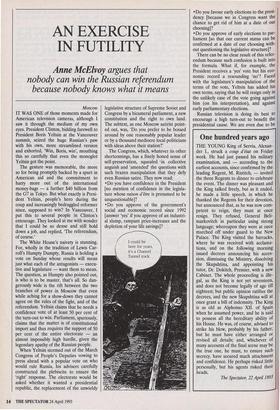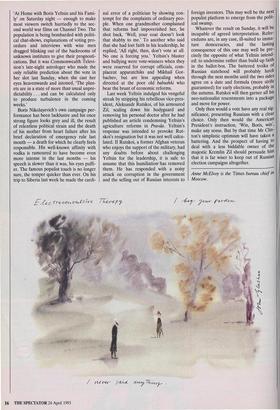AN EXERCISE IN FUTILITY
Anne McElvoy argues that
nobody can win the Russian referendum because nobody knows what it means
Moscow IT WAS ONE of those moments made for American television cameras, although I saw it through the medium of my own eyes. President Clinton, bidding farewell to President Boris Yeltsin at the Vancouver summit, seized the huge Russian's paw with his own, more streamlined version and exhorted, 'Win, Boris, win', mouthing this so carefully that even the monoglot Yeltsin got the point.
The gesture was memorable, the more so for being promptly backed by a spurt in American aid and the commitment to harry more out of the international money-bags — a further $40 billion from the G7 in Tokyo. But what exactly is Presi- dent Yeltsin, people's hero during the coup and increasingly bedraggled reformer since, supposed to win? In Vancouver, I put this to several people in Clinton's entourage. They looked at me with wonder that I could be so dense and still hold down a job, and replied, 'The referendum, of course.'
The White House's naivety is stunning. For, wholly in the tradition of Lewis Car- roll's Humpty Dumpty, Russia is holding a vote on Sunday whose results will mean just what each of the antagonists — execu- tive and legislature — want them to mean. The question, as Humpty also pointed out, is who is to be master, that's all. So dan- gerously wide is the rift between the two branches of power in Moscow that even while aching for a show-down they cannot agree on the rules of the fight, and of the referendum. Yeltsin claims that he needs a confidence vote of at least 50 per cent of the turn-out to win. Parliament, spuriously, claims that the matter is of constitutional import and thus requires the support of 50 per cent of the entire electorate — an almost impossibly high hurdle, given the legendary apathy of the Russian people.
When Yeltsin stormed out of the March Congress of People's Deputies vowing to press ahead with a popular vote on who would rule Russia, his advisers carefully constructed the plebiscite to ensure the `right' response. The electorate would be asked whether it wanted a presidential republic, the replacement of the unwieldy legislative structure of Supreme Soviet and Congress by a bicameral parliament, a new constitution and the right to own land. The subtext, as one Moscow satirist point- ed out, was, 'Do you prefer to be bossed around by one reasonably popular leader or by a thousand mediocre local politicians with ideas above their station?'
The Congress, which, whatever its other shortcomings, has a finely honed sense of self-preservation, squealed in collective anguish and 'amended' the questions with such brazen manipulation that they defy even Russian satire. They now read: • Do you have confidence in the President [no mention of confidence in the legisla- ture whose raison d'etre is presumed to be unquestionable]?
• Do you approve of the government's social and economic record since 1992 [answer 'yes' if you approve of an industri- al slump, rampant price-increases and the depletion of your life savings]? • Do you favour early elections to the presi- dency [because we in Congress want the chance to get rid of him at a date of our choosingj?
• Do you approve of early elections to par- liament [so that our current status can be confirmed at a date of our choosing with- out questioning the legislative structure]?
There can be no clear result of this refer- endum because such confusion is built into the formula. What if, for example, the President receives a 'yes' vote but his eco- nomic record a resounding 'no'? Faced with the legislature's manipulation of the terms of the vote, Yeltsin has added his own terms, saying that he will resign only in the unlikely case of the vote going against him (on his interpretation), and against early parliamentary elections.
Russian television is doing its best to encourage a high turn-out to benefit the presidential cause. We are even due to be `At Home with Boris Yeltsin and his Fami- ly' on Saturday night — enough to make most viewers switch hurriedly to the sec- ond world war films on Channel Two. The population is being bombarded with politi- cal chat-shows, explanations of voting pro- cedure and interviews with wise men dragged blinking out of the backrooms of unknown institutes to give their prognosti- cations. But it was Commonwealth Televi- sion's late-night astrologer who made the only reliable prediction about the vote in her slot last Sunday, when she cast her eyes heavenwards and intoned, 'The plan- ets are in a state of more than usual unpre- dictability . . . and can be calculated only to produce turbulence in the coming weeks.'
Boris Nikolayevich's own campaign per- formance has been lacklustre and his once strong figure looks grey and ill, the result of relentless political strain and the death of his mother from heart failure after his brief declaration of emergency rule last month — a death for which he clearly feels responsible. His well-known affinity with vodka is rumoured to have become even more intense in the last months — his speech is slower than it was, his eyes puffi- er. The famous populist touch is no longer sure, the temper quicker than ever. On his trip to Siberia last week he made the cardi- nal error of a politician by showing con- tempt for the complaints of ordinary peo- ple. When one grandmother complained that reforms had impoverished her, he shot back, 'Well, your coat doesn't look that shabby to me.' To another who said that she had lost faith in his leadership, he replied, 'All right, then, don't vote at all. No one is forcing you.' Yeltsin's bluster and bullying were vote-winners when they were reserved for corrupt officials, com- placent apparatchiks and Mikhail Gor- bachev, but are less appealing when directed at the poor old babushki who bear the brunt of economic reforms.
Last week Yeltsin indulged his vengeful streak by stripping his rebellious vice-pres- ident, Aleksandr Rutskoi, of his armoured Zil, scaling down his bodyguard and removing his personal doctor after he had published an article condemning Yeltsin's agriculture reforms in Pravda. Yeltsin's response was intended to provoke Rut- skoi's resignation but it was not well calcu- lated. If Rutskoi, a former Afghan veteran who enjoys the support of the military, had any doubts before about challenging Yeltsin for the leadership, it is safe to assume that this humiliation'has removed them. He has responded with a noisy attack on corruption in the government and the selling out of Russian interests to foreign investors. This may well be the next populist platform to emerge from the polit- ical swamp. Whatever the result on Sunday, it will be incapable of agreed interpretation. Refer- endums are, in any case, ill-suited to imma- ture democracies, and the lasting consequence of this one may well be pre- cisely the opposite of what Yeltsin intend- ed: to undermine rather than build up faith in the ballot-box. The battered troika of Russian statehood will probably lurch through the next months until the two sides agree on a date and formula (more strife guaranteed) for early elections, probably in the autumn. Rutskoi will then garner all his neo-nationalist resentments into a package and move for power.
Only then would a vote have any real sig- nificance, presenting Russians with a clear choice. Only then would the American President's instruction, 'Win, Boris, win', make any sense. But by that time Mr Clin- ton's simplistic optimism will have taken a battering. And the prospect of having to deal with a less biddable owner of the majestic Kremlin Zil should persuade him that it is far wiser to keep out of Russian election campaigns altogether.
Anne McElvoy is the Times bureau chief in Moscow.



























































 Previous page
Previous page